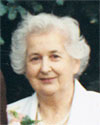
 |
||
| Home Page | Wetaskiwin Businesses | Community Organizations | Municipal Index | Maps | Site Map | Contact Us | | Photo Ads| | Camrose Online | Ponoka Online | ||
| History of Wetaskiwin: All information within has been provided by the Wetaskiwin & District Heritage Museum. |
| Search For Other Stories: Back to Women of Aspenland List |
 Topic: The Women of Aspenland
Topic: The Women of AspenlandArticle: Elsa (Mault) Clark Date Posted: August 26/2012 Main District: Wetaskiwin Decades: 1920's to 2000's
Elsa was born in North Wales, England on Dec 8, 1924 near a little village called Cymau. Elsa worked in a Welsh steel factory in the "cost" department. Glynne Clark, a young soldier raised on a farm east of Mulhurst, Alberta, came often to visit his Welsh Grandfather. Glynne's mother had been raised in Cymau; she immigrated to Canada in 1910. Glynne was stationed in Aldershot with the Glengarry Highlanders. On one of Glynne's walks to visit his grandfather in 1944, Glynne met Elsa who was returning home from her piano lessons. Elsa stopped to say hello and was taken aback by Glynne's friendly smile. The chance meeting of Elsa and Glynne turned into a two-year courtship. Often, they would visit, go for walks, watch movies and visit with Glynne's relatives. They were married April 20, 1946. Many war brides wore short dresses since wartime in Britain had caused huge shortages in many commodities and rationing coupons had to be saved up even to get a new dress. Elsa wore a blue crepe with matching hat. Glynne returned to Canada about three months before Elsa, sometime in July. Elsa came to Canada via ship, the Queen Mary. The ship was very crowded and the voyage was rough. It took three days and four nights. "I was scared because I knew no one." Most of the war brides were homesick. Elsa disembarked in Halifax at Pier 21. From Halifax, Elsa began a three-day train ride on the CNR line. "I remember seeing the country and thinking the country was so big and there was a lot of bush. We don't have that in England." Every so often, a war bride would disembark at a scheduled stop. One lady, who arrived in Timmons, was very surprised to find her husband dressed in the full regalia of an Indian Chief, headdress and all. When Elsa got off the train, she asked for Wetaskiwin and the workers were ready to put her on a train for Wascatenow. After some frightening confusion, Elsa was put on the proper train headed for Wetaskiwin. Glynne met her there and took her to his farm near Pigeon Lake. Elsa was welcomed by a field of trees that needed to be cleared and taken to the mill to be squared off. Once this job was done, a small log house was built. "I had never lived in a log house because [in England] they were all made of brick." Glynne's family was very friendly. They raised nine children, five daughters and four sons; the first born was a son named Norman, born on Jan 3, 1947. In the '60s, they built a larger home. For extra income, Glynne drove a truck and hauled oil or water back and forth to the drilling area. "The hardest thing for me was learning to bake bread and make soap. Glynne's mother was very kind and taught me these pioneer skills". "In the early days, we went to Portobello School at the Ten Mile Corner - we'd see George's slides" of wildlife or picnics at Bonnie Glen. In the winter, Glynne enjoyed ice fishing and hunted big game. Elsa would can the meat. The community was friendly and cooperative; "I took on their lifestyle and mixed with them, I had lived on a farm in Wales," but this was a much harder lifestyle. Despite the hardships, Elsa enjoyed her life in the Bonnie Glen District. "I was lonely those first few years because the neighbours were not too close, but I did get used to it." "I had an oak hope chest at home in Wales. To my new home, I brought my embroidered pillow slips, tablecloths, tea towels, aprons and pot-holders." Some Canadian expressions Elsa found strange were "I guess so" instead of saying a straightforward 'yes', "Good-bye" instead of 'Ta-ta' "I have been back to Wales twice but now I find it so small. I like the wide-open spaces now. I don't feel closed in." "At first, my new home was so far behind Wales. There you could just go to the bakery to get your baking." Elsa's scariest experience in the rugged west was trying to cross a swollen creek in a democrat (a kind of buggy pulled by horses); the water came up over the horses' backs as they crossed the creek. It was very frightening because the horses almost lost their footing. Once, Glynne was in the democrat and the horses bolted, they tore all the way to the Pipestone store, nearly two miles, before Glynne regained control.
Their marriage was a very happy memory for Elsa, as was the birth of each child. Their homestead has been passed on to Elsa's children. Glynne passed away on December 16, 2001 of cancer. Information compiled in 2003.
|
| Feedback: On behalf of Wetaskiwin Online I am pleased to offer these historical articles from the Wetaskiwin and District Museum for all our online viewers.
Should you have feedback regarding any of these articles please contact the Museum using the information further below.
Sincerely: Wetaskiwin & District Heritage Museum 5007 - 50 Avenue Wetaskiwin, Alberta T9A 0S3 Email: |